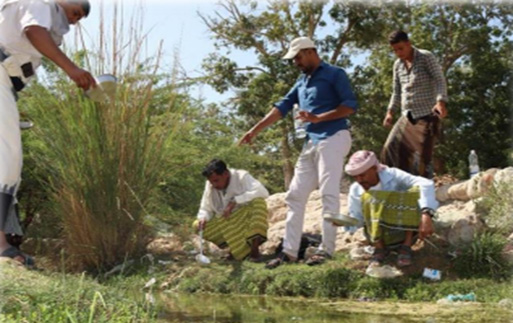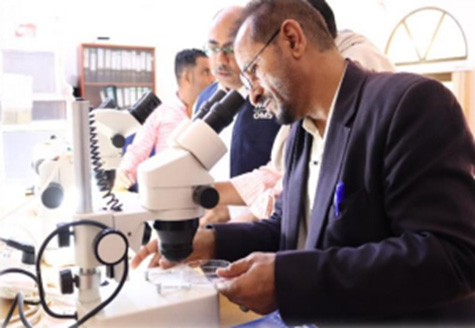 Entomological surveillance workshop for malaria in Socotra. Photo credit: M. Al Amoody 25 April 2024, Socotra Island and Tehama region, Yemen – Despite persistent efforts to prevent and control malaria in Yemen, about two thirds of the population remain at risk of the disease.
Entomological surveillance workshop for malaria in Socotra. Photo credit: M. Al Amoody 25 April 2024, Socotra Island and Tehama region, Yemen – Despite persistent efforts to prevent and control malaria in Yemen, about two thirds of the population remain at risk of the disease.
With World Bank support via the Emergency Human Capital Project (EHCP), WHO implements key interventions to deliver a tailored approach to malaria management at country level in line with the burden of disease. This includes capacity-building for malaria focal points and the rollout of indoor residual spraying campaigns for affected communities and those at risk.
WHO supported an indoor residual spraying campaign in the Tehama region, to cover Yemen’s 2310 highest malaria-burden neighbourhoods, in February 2024. The campaign directly protects more than 540 000 people from malaria and dengue, across 86 000 homes sprayed. It also indirectly protects more than 2 million people in targeted and neighbouring districts.
More than 780 spraying workers, 160 team leaders and 93 field supervisors carried out the campaign. This intervention builds on the last spraying campaign conducted by WHO under EHCP in the same region in November and December 2022.
Some areas of the country, such as Socotra Island, have made tremendous progress, and are working towards the goal of having no local malaria transmission. Socotra started working towards malaria elimination in 2000, with no local cases reported since 2005.
In March 2023, WHO conducted a pre-elimination assessment on the island, in line with WHO guidelines to identify any gaps and boost readiness in case malaria is imported from other parts of the country or abroad. This is a particular risk due to the frequency of tropical cyclones affecting Socotra, as well as the impacts of climate change and the humanitarian situation in Yemen and nearby countries.
> Following this assessment, a training of trainers session was conducted, in February 2024, for 20 malaria staff from Hadhramaut, Marib and Socotra governorates. This sought to enhance their skills in surveillance, diagnosis, case management and vector control.
Following this assessment, a training of trainers session was conducted, in February 2024, for 20 malaria staff from Hadhramaut, Marib and Socotra governorates. This sought to enhance their skills in surveillance, diagnosis, case management and vector control.
Soon after the training, in Socotra, reports were received of an imported suspected malaria case. The trained staff moved quickly to implement active case detection – based on the protocol learned at the session – including clinical diagnosis, rapid diagnostic testing, and laboratory confirmation. The case tested positive, having recently travelled to Socotra from Hudaydah, a high-burden governorate. The individual was provided a course of treatment and was followed up until fully recovered.
Preliminary results of one such innovation, an assessment of climate-related risks of malaria and other climate-sensitive diseases, are expected to be available in June 2024. This crucial information will contribute to the continuation of evidence-informed action to tackle malaria in Yemen.








